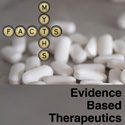In episode 130, Mike and James run directly into the face of the evidence around exercise and really sweat out the weightiness of the results. We actively find out that it’s primarily all about quality of life, and that Mike bikes and James rollerblades to keep themselves as close to perfect physical specimens as possible. At the end we find out they also both take medications for delusions of grandeur.
Show notes
1) Activity-related benefits
Cochrane 2002;(4):CD003404
J Gerontol A Biol Sci Med Sci 2008;63:997-1004
J Sports Med Phys Fitness 2007 Dec;47:462-7
Cochrane 2008 Oct 8;(4):CD004366
Cochrane 2008 Oct 8;(4):CD004376
Arch Intern Med 2007;167:2453-60
JAMA 2003;289:2379-86
NEJM 2002; 347 (10): 716-25
JAMA 1995; 273 (14): 1093-8
Circulation 2008;117: 614-22
PLOS 2008; 5(1): e12
2) Quality of life and dose response
Arch Intern Med 2009;169:269-78
Circulation 2010;122:743-752
Br J Sports Med 2008;42:238–43
NEJM 1999;341:650-8
Eur J Epidemiol 2009;24:181–192
3) Exercise for overall benefit not on surrogate markers
J Appl Physiol 2008;105:766–8
4) RCT evidence on exercise
Circulation 2004;109:1371-8
Am J Med 2004;116:682–92
5) Motivating patients
JAMA 2007;298:2296-304
Res Q Exerc Sport 2009;80:648-55
Int J Behav Nutr Phys Act 2008;5:44
Diabetes Care 2009;32:1404-10
Arch Intern Med 2007;167:2453-60
JAMA 1995;273:1093-8
Ann Fam Med 2008;6:69-77
Am J Public Health 1998;88:288-91



